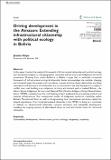Files in this item
Driving development in the Amazon : extending infrastructural citizenship with political ecology in Bolivia
Item metadata
| dc.contributor.author | Hope, Jessica | |
| dc.date.accessioned | 2021-02-11T10:30:17Z | |
| dc.date.available | 2021-02-11T10:30:17Z | |
| dc.date.issued | 2022-06-01 | |
| dc.identifier | 272217548 | |
| dc.identifier | 3986f579-30c4-4561-a8e3-dabb094dffd9 | |
| dc.identifier | 85132341642 | |
| dc.identifier | 000809620500002 | |
| dc.identifier.citation | Hope , J 2022 , ' Driving development in the Amazon : extending infrastructural citizenship with political ecology in Bolivia ' , Environment and Planning E: Nature and Space , vol. 5 , no. 2 , pp. 520-542 . https://doi.org/10.1177/2514848621989611 | en |
| dc.identifier.issn | 2514-8486 | |
| dc.identifier.other | ORCID: /0000-0002-8726-8880/work/88731606 | |
| dc.identifier.uri | https://hdl.handle.net/10023/21411 | |
| dc.description | This research was funded by an RGS Environment and Sustainabilty Grant and by a Vice-Chancellor’s Fellowship at the University if Bristol. | en |
| dc.description.abstract | In this paper, I extend the analytical framework of infrastructural citizenship with political ecology and reorientate analysis to rural geographies, extractive infrastructure and indigenous territorial movements. Drawing from recent fieldwork in Bolivia, I argue that an extended conceptual framework of ‘infrastructural ecological citizenship’ better acknowledges the multiple, changing and contested ways that people and rural places co-exist and how these relationships are being reworked as infrastructure and citizenship are co-constituted. I use this framework to analyse a conflict over road building in an indigenous territory and national park in lowland Bolivia – the Isiboro Sécure Indigenous Territory and National Park (Territorio Indígena y Parque Nacional Isiboro Sécure; TIPNIS), revealing how the road building project weakened the pre-existing political and material infrastructures that underpinned modes of indigenous territorial citizenship within Bolivia’s Plurinational State, as well as foregrounding how transnational extractive capital has shaped negotiations of territorial place-based citizenship in the TIPNIS. In doing so, I contribute to debates on infrastructural citizenship, resource extraction and sustainable development, revealing the ongoing potency of place-based claims on land and related claims for territorial citizenship. | |
| dc.format.extent | 23 | |
| dc.format.extent | 227632 | |
| dc.language.iso | eng | |
| dc.relation.ispartof | Environment and Planning E: Nature and Space | en |
| dc.subject | Sustainability development | en |
| dc.subject | Infrastructure | en |
| dc.subject | Political ecology | en |
| dc.subject | Indigeneity | en |
| dc.subject | Citizenship | en |
| dc.subject | G Geography (General) | en |
| dc.subject | GF Human ecology. Anthropogeography | en |
| dc.subject | T-NDAS | en |
| dc.subject.lcc | G1 | en |
| dc.subject.lcc | GF | en |
| dc.title | Driving development in the Amazon : extending infrastructural citizenship with political ecology in Bolivia | en |
| dc.type | Journal article | en |
| dc.contributor.institution | University of St Andrews. Geographies of Sustainability, Society, Inequalities and Possibilities | en |
| dc.contributor.institution | University of St Andrews. School of Geography & Sustainable Development | en |
| dc.identifier.doi | 10.1177/2514848621989611 | |
| dc.description.status | Peer reviewed | en |
This item appears in the following Collection(s)
Items in the St Andrews Research Repository are protected by copyright, with all rights reserved, unless otherwise indicated.

